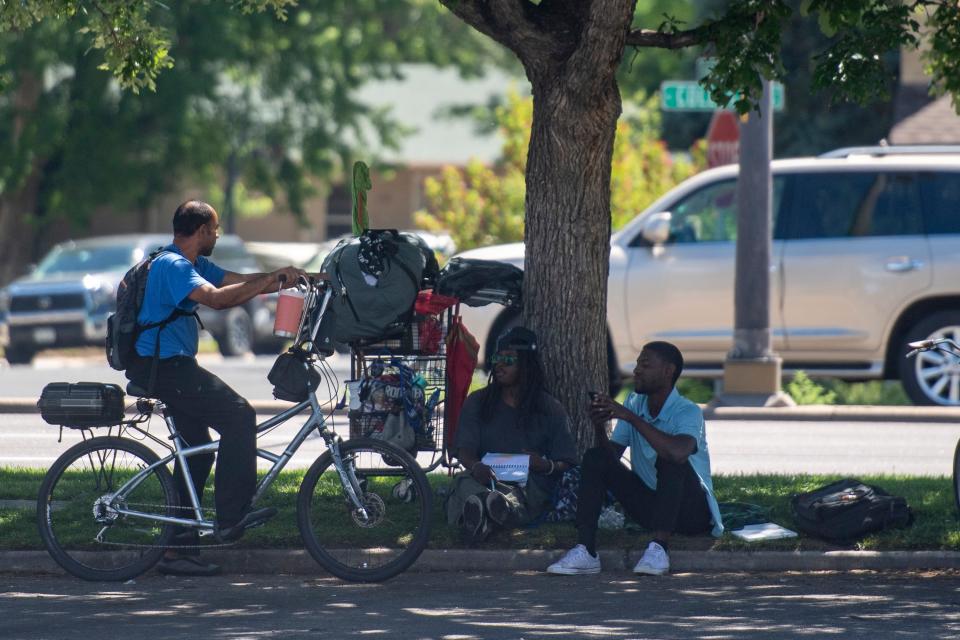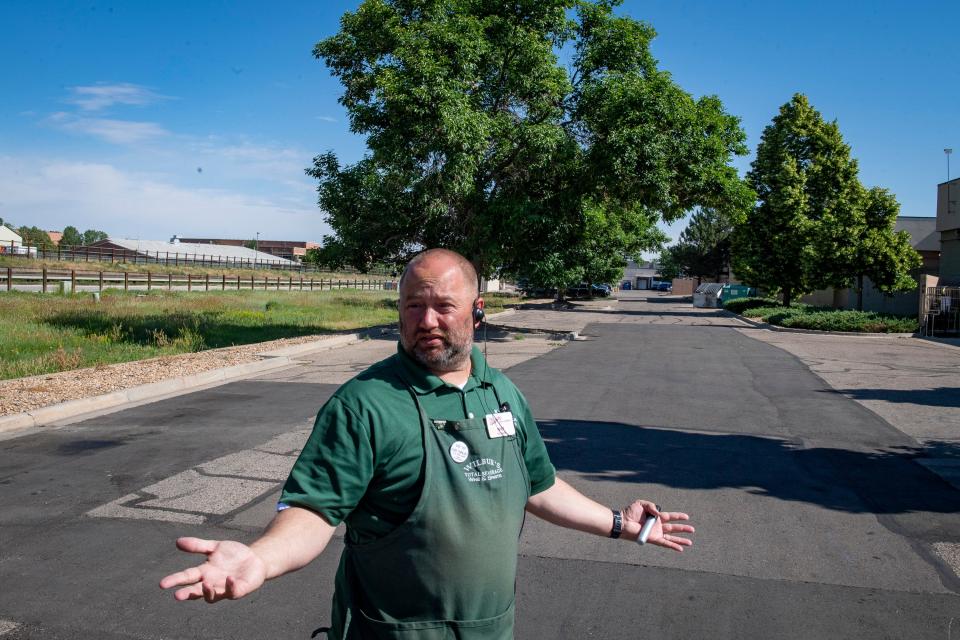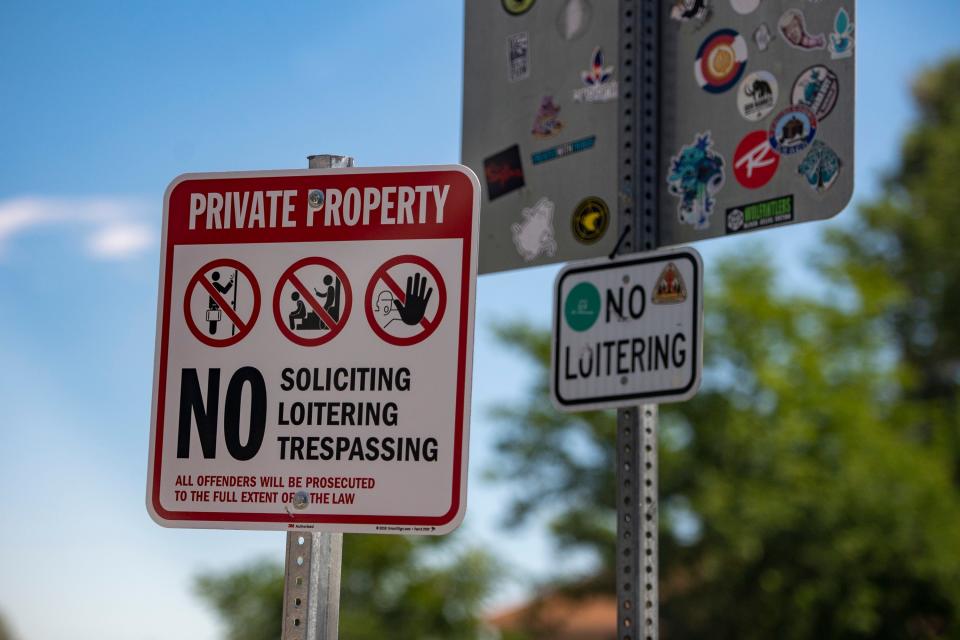Outreach Fort Collins to expand, wants to be 'antidote to despair' for homeless, businesses
Outreach Fort Collins plans to expand its services from Old Town to Midtown in September amid growing tension between businesses and people experiencing homelessness.
In early June, the city cleared out an encampment behind the old Kmart, cleaning up 30 bags of trash, a handful of needles and old bike frames. Two weeks later, they cleaned up an encampment along Blue Spruce Drive in north Fort Collins, moving some of the people who may have relocated north from Midtown.
Merchants say crime and panhandling in Midtown — an area the city generally defines as the College Avenue corridor from Prospect Road to south of Harmony — have risen exponentially in the past few years, harming their businesses and making employees and customers feel unsafe.
Mat Dinsmore, owner of Wilbur's Total Beverage, 2201 S. College Ave., and Wine & Liquor Specials, 2439 S. College Ave., says his employees have been harassed and assaulted, he's been threatened by a man with a brick and he's constantly asking people who he presumes to be homeless to move along.
It's often been a problem, "but in the last three years it's been out of control," he said.
It's hard to pinpoint how many of the complaints are caused by people experiencing homelessness or the collateral effects of growing city — how much is the result of illegal behavior and how much the result of societal discomfort?
"Labeling people is a problem," said Brad Rhoda, executive director of Outreach Fort Collins, a nonprofit formed to maintain downtown as a "safe and welcoming place" while connecting people with services. "There is certain behavior, like appearance, that throw us off that are not illegal. That is where we can step in. These are the issues we want to respond to."
MAX bus line a path to services, south Fort Collins
Police, businesses and service providers say the MAX bus line that began running in 2014 made it easier for for people to get from Old Town to Midtown and points south. They also say outreach efforts to curb disruptive behavior downtown may have pushed people south.
"We've seen a lot more," said Mike Dellenbach of Dellenbach Motors, 3111 S. College Ave. People experiencing homelessness "have been pushed out of Old Town and are moving south. You find them living under Swallow (Road) — there's a big ditch behind us that has to be cleaned out when (the ditch company) gets ready to run water."
Dellenbach doesn't think MAX is necessarily to blame for problems that have arisen. He said it "makes it easier for them to get out here" and to Redtail Ponds at the end of the MAX line.
Redtail Ponds, 60 permanent supportive housing units for formerly homeless residents, "is a great model and MAX helps them get to services, but it also invites others to come this direction," he said.

Related: Fort Collins Rescue Mission chooses new site for shelter for men experiencing homelessness
Dellenbach said he's called police before, mostly for safety reasons. "You see someone acting crazy and wandering on College and you don't want them walking down the middle of the street and getting hit. We call for their safety."
About half of the people experiencing homelessness who get breakfast at the Salvation Army on Mason Street likely take the MAX line to get there, Rhoda estimates. "The other 50% are already there in the shadows," he said.
The Midtown Business Improvement District and Outreach Fort Collins recently held a meeting for merchants and service providers to discuss the issues. Businesses were largely absent from the two-hour meeting at Foothills Activity Center. One merchant said that's because no one wants to be labeled as being against people experiencing homelessness.
How Fort Collins has tried to address conflicts
Rhoda cautioned about equating homelessness with criminal behavior. "It's a dangerous error to confuse the two," he said.
"People experiencing homelessness are part of this community, too," Rhoda said. "Homelessness is a complex issue and there are a lot of reasons people get into homelessness."
While the optics may not be good, panhandling or sleeping on a bench or the bus is not illegal and being homeless is not a crime, Rhoda said. "People tend to say this is black, this is white, this is right, this is wrong."
If a person is asleep, maybe smells funny, it's optics — not illegal, he said.
Police can cite people for urinating in public, harassment or other illegal behavior, but they can't arrest or ticket someone for not having a home, being disheveled or asking for money.
"We get calls about people sitting on the sidewalk talking to a sign. That's not a crime," said Lt. Kelly Weaver of Fort Collins Police Services' Division 1 in Old Town.
Nor is panhandling. "It's a freedom of speech issue," added Fort Collins Police Sgt. Justin Gallimore. "A lot of people don’t understand that."
The city has taken steps over the years to try to reduce conflicts, including passing a short-lived panhandling ordinance and an ordinance in 2017 that prohibits blocking sidewalks and entryways to businesses.
The city revised the panhandling ordinance after a lawsuit by the American Civil Liberties Union. A handful of prohibitions that were not challenged remain in place, including intimidating, threatening, coercive or obscene panhandling, touching or grabbing the person solicited, or blocking the person from passing.
In 2015 and 2017, the City Council considered implementing strict rules intended to address complaints about people who live on the streets whose actions were scaring away visitors to Old Town.
Proposed rules included a one-hour time limit for sitting on a bench. But the ACLU threatened to sue the city over what it considered an unconstitutional sit-lie ban, and community members complained the rules would target people who have no place to go when shelters were closed during the day.
Since then, Fort Collins Rescue Mission and Catholic Charities have adopted a 24/7 model providing space for men, women and families to stay day and night. When shelter beds are full, as they were recently when encampments popped up in Midtown and north Fort Collins, unhoused people are on their own to find a place to rest for the night.
Efforts are also underway to provide more shelter beds for men who want them. Fort Collins Rescue Mission has selected a site on North College Avenue for a new facility that could accommodate up to 300 men, but construction is still a couple years away at the earliest.
What the numbers say
According to the city of Fort Collins, there were nearly 900 chronically homeless people in the first quarter of this year and 1,313 Poudre School District students in kindergarten through 12th grade who are experiencing homeless. More than 2,900 people were enrolled in supportive services, according to Brittany Depew, homelessness specialist with the city of Fort Collins.
That could largely be an undercount as not all people experiencing homelessness seek services.
According to data, Fort Collins police responded to 93 calls involving transient individuals in Midtown last year and 26 so far through the first week of June. Most calls centered around and behind the vacant Kmart building, 2535 S. College Ave., and University Plaza, which includes Whole Foods, 2201 S. College Ave.
The number of calls is a fraction, 4%, of total police calls to Midtown.
Rhoda and his staff of nine have been touring Midtown, getting the lay of the land, "looking for hot spots, learning the geography" and starting to forge relationships with business owners and people experiencing homelessness. He isn't sure how many faces will be familiar from his work in Old Town.
"We've heard people say Midtown is like Old Town 10 years ago," Rhoda said. "That sounds alarmist. Old Town was really rowdy 10 years ago."
In 2014-15, many downtown merchants were in pitched battles with aggressive individuals harassing employees and customers while panhandling, people sleeping on their front stoops, drug and alcohol use throughout Old Town.
"Police were being pulled away to take care of a guy yelling at another guy," Rhoda said.
That's when the city, police and mental health service providers thought there must be a better way to deal with people experiencing homelessness and engaging in problematic behaviors.
While police tried to create relationships with people experiencing homelessness, a task force was formed to identify possible solutions. After that group visited Burlington, Vermont, to see its street outreach team in action, Outreach Fort Collins launched in 2016.
Initially just a pilot program with three staff spending most weekdays in Old Town, Outreach now has nine staff members thanks to a $100,000 grant to add two staff to support the Midtown expansion.
"We know the hot spots, we know the bridges and the gathering places," Rhoda said. "We walk around and checking in with people as to how we can help." Outreach also responds to complaints, engages with the person trying to de-escalate the situation."
Outreach's clients may be longtime residents, some of whom are chronically homeless. Others are transient individuals who are less invested in the community. Those experiencing homelessness are on the streets for a variety of reasons, including poverty, substance abuse, and physical and mental illness.
Rhoda, who joined Outreach Fort Collins in October, credits the organization, police and mental health specialists with finding new ways to deal with complaints and connecting people experiencing homelessness with resources and services.
In 2020, when Fort Collins Rescue Mission opened an overnight emergency shelter on Blue Spruce, Outreach expanded its services to north Fort Collins. Now it will expand to the south.
"We have to go long, not wide," Rhoda said about Midtown, referring to heat maps that show areas of concern along the retail corridor of College Avenue. The area along the MAX line behind businesses, where there is natural cover, is where people hang out, he said.
When police get a call about a conflict involving a person experiencing homelessness, an Outreach Fort Collins worker and possibly a mental health worker will be contacted and dispatched if the complaint does not involve a crime.
If a crime is being committed, police will also respond.
Assistant Police Chief John Feyen said he didn't know if tension between merchants and people experiencing homelessness is "worse than it was two, three, four years ago, but it's becoming more apparent."
Recently erected fencing around the old Kmart site is helping keep people out until it is redeveloped as a new King Soopers, Dinsmore said.
During the recent meeting at Foothills Activity Center, the mall's head of security, Mike Moskalski, told of a person experiencing homelessness behaving erratically and scaring outdoor diners, costing the restaurant business.
"That's $1,000 out of their pocket right there," he said. A later statement from mall owners said the incident to which Moskalski was referring was isolated and resolved quickly.
"There is no significant issue with the homeless or transients," the statement read. "There are occasions when people that come to the property appear to be in this condition, but generally, they do not cause problems for patrons or employees."
Auto dealers lining College Avenue have seen issues. "We've had people living in vans on our property and a couple pieces of property we rent in Midtown," Dellenbach said. "Get back in the bushes and there are needles and drug paraphernalia. I'm glad to see Outreach coming this direction. Hopefully, that will help."
Some of the problems aren't necessarily always a job for police, Dellenbach said. "If we had someone that can be buffer between that person ... it's better for both entities."
One business owner, who asked not to be named for fear of repercussions, said some people leave shopping carts full of their belongings in front of his Midtown business. He's cut down landscaping and a privacy fence that hid the trash bin to eliminate areas where people could sleep.
Dinsmore says he can ask people to move from in front of his business but can't do anything about a 15-foot easement on College Avenue that's public property. Individuals often occupy signalized intersections along College Avenue asking for money, sometimes stashing their belongings along the public easement.

Dinsmore doesn't have any answers but hopes Outreach Fort Collins will make a difference.
"I don't want to sound like a heartless bastard, but I am becoming one," he said. "I love people, I love bringing joy to people's lives. But I have two kids at home and when they're asking what bad things happened today in Fort Collins, that's scary."
Gallimore, who works in Division 1 in Old Town, said, "at the end of the day ... if customers are not happy or are fearful, they will go somewhere else. It's a legitimate concern" for businesses.

What can the city do?
Fort Collins spends north of $100,000 annually contracting with Custom Environmental to clean up encampments on average twice a month, said Ryan Kogut, senior supervisor for the city's Natural Resources Office.
Cleanup crews could hit several camps in one day, sometimes up to 40 in a day. This year, crews have already cleaned up 200 encampments, Kogut said. There could be 20 to 40 camps a day under bridges, standard encampments. Some could be a 5-minute cleanup."
Most are small — one or two tents, he said, "But if not addressed early on, some camps get fairly large." The recent encampment at Blue Spruce Drive "was an anomaly," Kogut said. "Most are not that big."
The city typically gives people using a camp 24 hours notice to remove their personal belongings. "That said, we don’t get out there the next day, so they have more time than that," he said. "When we're only doing two cleanups a month, they're not going to get booted out."
Most have packed up and moved on before contractors and city staff return.
The city uses field maps through GIS technology to identify camps, "which makes it more efficient to go in," Kogut said. "We know exactly where every camp is and go in and remove the trash and try to clean up waste that would be on the premises."
Kogut said he couldn't estimate if the number of encampment cleanups have changed over the years because the city pays for two a month. "It does keep the numbers down, so I think that's a nice level of service to the community."
The annual budget for cleanups hasn't increased either, nor does it need to, Kogut said. "We're at a pretty good place with it. We're being responsible and really being supportive of the homeless community. It's a complex issue."
What will success look like in Outreach's expansion?
Rhoda said he'll measure success first and foremost by his staff.
Most of the $100,000 grant that allowed the organization to expand went to the organization's staff. "More funding is more boots on the ground, but if we expand down to Midtown and our service in Old Town deteriorates, we will have to think of something else. Old Town is the heart of Outreach Fort Collins."
He won't say that in five years everything will be better, but he hopes people will feel "like there is action and feel we have their best interests in mind. If their employees feel safe because of our work, that is success.
"We want to be the antidote to despair in the homeless community and the business community," Rhoda said.
Pat Ferrier is a senior reporter covering business, health care and growth issues in Northern Colorado. Contact her at patferrier@coloradoan.com.
This article originally appeared on Fort Collins Coloradoan: Outreach Fort Collins expanding services for homeless to Midtown

 money
money 